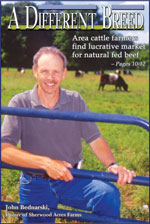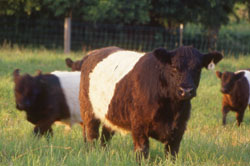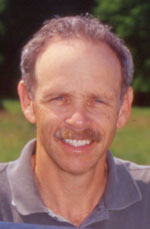



A Different Breed
Area
cattle farmers
find profit in natural-fed beef
La
Grange’s Bednarski, Henry County’s Hunt
among those in specialty market
By
Helen E. McKinney
Contributing Writer
 |
|
February
2007 |
LA GRANGE, Ky. (February 2007) – Jon Bednarski’s
idea of turning a hobby into a profitable business has become a dream
come true. Bednarski has found a way to turn part-time farming into
a potentially lucrative second career.
From his 50-acre Sherwood Farm on Ballard School Road in La Grange,
Ky., Bednarski hopes to raise up to 20 head of natural fed beef per
year. His choice of cattle is Belted Galloways, well known for consistently
producing high-quality natural beef.
Belted Galloways, or Belties, are a Northern-bred cattle originally
from Scotland. Bednarski chose them because they are “unique and
different,” he said. The medium-framed breed also is easy to handle,
another plus, he said.
But what differentiates Bednarski’s beef from others is what they
eat. His Belties are primarily grass-fed in rotational pastures, which
in turn produce leaner beef. They may have a slower growth rate, but
they are healthier, he asserts.
The meat is lower in fat and cholesterol than that of other beef. They
are thick furred animals, said Bednarski, having almost 4,000 hairs
per square inch. This reduces the amount of back fat on them.
The cattle are steroid free and hormone free, so there is no chemical
residue in the beef. Their free-range diet is supplemented with corn
and soybeans, and they have been raised in a low-stress environment,
which makes the meat more flavorful and tender. Bednarski has raised
Belties for the last three years, growing them until they weigh approximately
1,100 pounds before shipping them to market.
Bednarski has worked for more than 25 years for Northeastern Log Homes
but founded Sherwood Acres in 1991. Bednarski and his business associate,
Dan Weintraub, set a goal to provide the local area with a healthy alternative
to mass-produced, store-bought beef.
|
U.S.
Beef Production Statistics:
• There
are approximately 800,000 ranchers and cattlemen in the United
States. Source: National and Kentucky Cattlemen’s Beef Associations |
Originally from Vermont, Bednarski didn’t know a
lot about the natural fed beef market at first, but figured there must
be a way to take his hobby a step further. He did his homework and found
that “the biggest help to me were the county agents, and visiting
farms.” He took part in local county extension offerings of Farm
Field Days, even hosting one at Sherwood Acres.
He said that the key to being successful in the natural fed beef market
is to become knowledgeable about the industry. Bednarski furthered his
knowledge by becoming a certified member of the Master Cattleman’s
Association. He took part in this year-long course, sponsored by the
University of Kentucky Cooperative Extension Service.
The program is held in multiple counties, said Oldham County Agriculture
and Natural Resource Agent Traci Missun. It consists of 10 different
educational sessions and two intense days of hands-on training. Every
session covers a different topic that includes forages, management skills,
nutrition, animal behavior, genetics, reproduction, herd health, marketing
and profitability.
“These classes cover the whole gamut of what you need to know to
raise cattle and be profitable,” said Missun. The goal is in “learning
what to do to improve the end product.”
Graduates of the Master Cattleman’s Program receive a farm gate
sign and are honored at the Kentucky Cattleman’s annual convention.
Missun said there are currently 40 beef producers enrolled in the program.
In the end, beef producers “learn things to be more profitable,
what the market demands are, how to be environmentally responsible and
how to handle a herd,” Missun said. This is the seventh year for
the program, which is partially funded with tobacco settlement money.
Dr. Roy Burriss, UK Extension beef specialist who heads up the program,
said it is an intense, educational program aimed at beef producers.
“We want our Kentucky producers to be able to participate in any
market or arena they want to.” As long as producers are able to
work within the perimeter of what is safe in terms of beef production,
they can “meet the requirements of the market,” said Burris.
“We can’t profit from something we mishandle,” Burris
said. He believes this program can persuade consumers to be more open-minded
to farmers producing different things. It helps create a vision for
the future.
 |
|
Photo
provided Jon
Bednarski’s La Grange, Ky., |
“Farmers are often positioned as users instead of
caregivers,” said Burris. “Most care about the land and are
stewards of it,” an idea reinforced through the program.
From the Master Cattleman’s Program, Bednarski obtained information
on a Kentucky Department of Agriculture beef marketing cost-share program
that paid for half of the initial setup and promotional expenses. Promoting
his product right from the beginning is a key factor for him. He has
spent money up front for a website, business cards and high-quality
literature to distribute in different venues. And his efforts are paying
off.
When searching for suitable markets in which to sell his product, Bednarski
tapped into the already popular farmer’s market venue. “We
knew we didn’t want to go into restaurants and chains,” he
said, preferring instead to service the county, local farmer’s
markets and health food stores. He knew he had a hot commodity because,
“people look for farm-raised products.”
This where the expertise of his associate at Northeastern for more than
20 years, Weintraub, came in handy. Weintraub’s job is to market
the beef because it was “just a natural thing for me to do,”
he said.
Weintraub had the sales experience to find viable markets for the USDA
inspected beef. He said there is “definitely a niche market by
being a small volume producer.” There is also plenty of “room
for growth.”
Other farmers are getting into the natural fed beef business. Lonnie
Hunt, who lives on Bethlehem Road in nearby Henry County, Ky., began
selling natural fed beef in January 2006. Hunt raises 115 head of Black
Angus beef cows.
Hunt had taken a trip out west through the Cattleman’s Association
and, upon talking to farmers there, decided natural fed beef cattle
were the way to go.
“I did not like the steroids and hormones that were being given
to cattle,” said Hunt. “I wouldn’t eat that kind of meat
myself.”
Semi-retired, Hunt is “trying to establish my business and prove
to myself that a farmer can do this and make a profit.” Hunt is
more than willing to share his knowledge of the business with others.
Hunt sells his beef directly to the public, even delivering it from
his own freezer truck.
 |
|
"People
are looking for farm-raised products." |
“People need to eat healthier,” he said. When
a customer buys his beef, they know what they’re getting; there’s
no guesswork involved as to where the meat came from. He hopes to get
into the Farmer’s Market venue this year.
Bednarski’s meat is sold by individual cuts, and a Sample Pack
may be purchased for $75. Sherwood Acres beef is also sold at two Louisville
area food stores – Campbell’s Gourmet Cottage and Amazing
Grace.
Paul Koenig, owner of the latter business, began selling Bednarski’s
product within the last month. With the inventory of Amazing Grace being
99 percent organic, Koenig said he was attracted to the quality of Bednarski’s
beef.
The fact that there “is a lack of anti-biotics used and the way
he treats the animals” ensures a quality product, said Koenig.
“I know there is a demand,” he said. “The taste alone
is hands-down.”
With more individuals becoming health conscience, Koenig can assure
his customers that he knows what he’s talking about when it comes
to his offerings. “I do a lot of Internet research,”said Koenig.
His managers are also strict about the products they buy.
To further attest to the quality of Sherwood Acres beef, the product
is now a member of Kentucky Proud, which consists of natural Kentucky
grown farm products.
• To learn more or purchase Jon Bednarski’s natural fed beef, visit: www.SherwoodAcresBeef.com or call (502) 222-4326. To learn more about Lonnie Hunt’s business, visit: www.kycattleco.com or call (502) 543-3683.